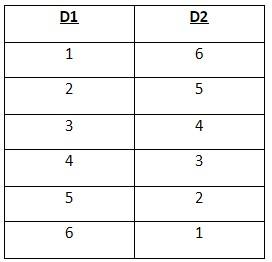Question
Question: Two unbiased dice are rolled once. What is the probability of getting a sum equal to 7?...
Two unbiased dice are rolled once. What is the probability of getting a sum equal to 7?
Solution
Hint: Probability is a measure of the likelihood of an event to occur. It can be mathematically represented as total number of outcomesNo. of favourable outcomes.
Complete step-by-step answer:
Let Dice 1 be D1 and Dice 2 be D2
Now combinations which will result to favourable outcome i.e. Sum of D1 and D2 is 7 will be

So, number of favourable outcome when sum of D1 and D2 are 6
and total number of outcomes will be 6×6=36
So, we know that probability of an event = total number of outcomesNo. of favourable outcomes
So, the probability of sum of two dices to be 7 = 366=61
Note: In these types of questions where the number of favourable outcomes are countable draw a sheet of all the possible outcomes and then divide it with the total number of outcomes to get probability of an event.
